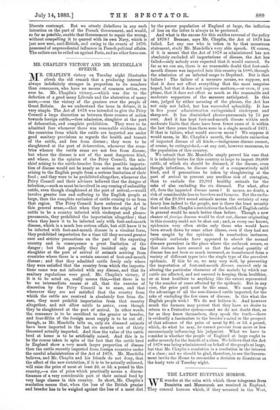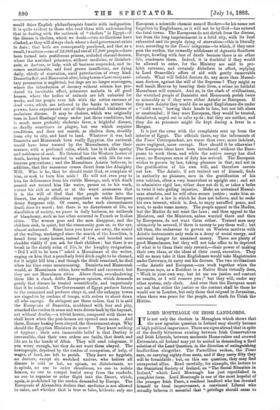THE LATEST EGYPTIAN HORROR.
WE wonder at the calm with which these telegrams from Damietta and Mansourah are received in England. They conceal horrors which, if they occurred in the West, would drive English philanthropists frantic with indignation. It is quite evident to those who read them with understanding that in dealing with the outbreak of " cholera " in Egypt—if the disease is cholera, which we doubt—two civilisations have clashed, as they will always clash where a dual government exists in Asia ; that both are consequently paralysed, and that as a result, two cities—one of 32,000 and one of 17,000 people—have been turned into pestiferous prisons, secluded charnel-houses, where the wretched prisoners, without medicine, or disinfect- ants, or doctors, or help, with all business suspended, and in- comes unattainable, and food grown insufficient, are dying daily, chiefly of starvation, amid putrefaction of every kind. Damietta first, and Mansourah after, being towns where every sani- tary precaution is neglected, but dogs are no longer scavengers, where the introduction of decency without science has pro- duced its inevitable effect, poisonous malaria in all good houses, where the bodies of animals are left unburied for weeks, and the people even fish with the rotten carcases of dead cows, which are tethered to the banks to attract the prawns, have experienced one of their periodical visitations of malarious disease. It may be cholera, which was originally born in Lord Hastings' camp wider just those conditions, but is much more probably choleraic fever, a frightful disease, as deadly sometimes as plague, but one which requires conditions, and does not march, as cholera does, steadily from city to city, and land to land. Whatever it was, had Damietta and Mansourah been really Egyptian, the outbreak would have been treated by the Mussulmans, after their manner, with a profound calm, which has in it alike apathy and nobleness of soul. No Oriental has the Western horror of death, having been wearied to suffocation with life for con- tinuous generations ; and the Mussulman Asiatic believes, in addition, that the summons comes direct from the Almighty Will. Who is he, that he should resist God, or complain of him, or seek to turn him aside ? He will not even pray to him for deliverance from his visible Message, and, with death poured out around him like water, passes on to his work, nurses his sick as usual, or at the worst announces that it is the will of God that the people 'retire into the Desert, the single efficacious expedient on which European Army Surgeons rely. Of course, under such circumstances death does its worst ; but there is no disturbance of life, no dissolution of society, no pause in daily business, no outbreak of blasphemy, such as has often occurred in French or Italian cities. The women pass and the men disappear, and the children sink, in quiet, but the community goes on, to the eye, almost unharmed. Some faces you knew are away, the sound of the wailing, unchanged since the march of the Israelites, is heard from many houses, instead of few, and bearded men shudder visibly if you ask for their children ; but there is no break in the stately calm of life, in the haughty resignation. " Did I will to be born ?" asked a Mussulman of the writer, urging on him that a peculiarly fetid ditch ought to be cleaned, for it might kill him ; and though the ditch remained, he died when his time came unmurmuring. Damietta and Mansourah would, as Mussulman cities, have suffered and recovered, but they are not Mussulman cities. Above them, overshadowing them like a cloud, drifts European opinion, which demands gently that disease be treated scientifically, and imperiously that it be isolated. The Government of Egypt perforce listens to the command and perforce obeys it, and the unhappy towns are ringed-in by cordons of troops, with orders to shoot down all who emerge. So stringent are these orders, that it is said the Europeans of Damietta, maddened with fear and pity, attacked the cordon in arms and were driven back by the bayonet,
not without deaths, trivial horror, compared with those we shall know when the pest-houses are opened once more. And there, Europe having been obeyed, the Government stops. Why should the Egyptian Ministers do more ? They know nothing of hygiene ; their own immovable belief is that Destiny is irreversible, that their own orders are futile, that death and life are in the hands of Allah. They will send telegrams, if you worry enough, but they do not want them obeyed. The townspeople, deprived by the cordon of occupation, of help, of wages, of food, are left to perish. They have no hygeists, no doctors, except six wretched natives, who believe all disease is cold or hot, no opium, no disinfectants, no hcspitals, no one to order cleanliness, no one to isolate houses, no one to compel burial away from the roadside, no one to organise or order flight into the Desert, which, again, is prohibited by the cordon demanded by Europe. The Europeans of Alexandria declare .that medicine is not allowed to enter, and whether that is true or false, hitherto only one
European, a scientific chemist named Hooker—be his name not forgotten by Englishmen, as it will not be by God—has entered the fatal towns. The Europeans do not shrink from the disease, but from the long imprisonment in a fetid city, with its food exhausted and its people dying of starvation—this is literally true, according to the Times' telegrams—to which, if they once pass the cordon, the cowardly selfishness of Agnostic Southern Europe, howling with fear of death because there is no other life, condemns them. Indeed, it is doubtful if they would be allowed to enter, for the Ministry are said to pro- hibit entrance, and certainly disbelieve in effort, replying to Lord Granville's offers of aid with gently immovable refusals. What will Infidel doctors do, any more than Mussul- man doctors, against the will of the Supreme They might as well insult Heaven by insuring their lives, a crime no faithful Mussulman will commit. And so, in the clash of civilisations, the wretched people of Damietta and Mansourah perish twice as miserably as if they were either Asiatic or European. If they were Asiatic they would die as aged Englishmen die under a " cold wave," bowing their heads to fate, but not left alone or unattended ; if they were European, they would be treated, disinfected, urged out to safer spots ; .but they are neither, and they die as prisoners might die kept during a fever in a Morgue.
It is lust the same with the complaints sent up from the interior of Egypt. The officials there, say the informants of the Times' Correspondent, are worse than ever, more indolent, more negligent, more corrupt. How should it be otherwise ? The European ideas have been introduced without the Euro- peans to work them, and while the native energy has died away, no European sense of duty has arrived. The European wishes to govern by law, taking pleasure in that, and not in the gratification of his own will, and therefore carries out law. The Asiatic, if not trained out of himself, finds in authority no pleasure, save in the gratification of his own volition, often a very benevolent or upright one ; and set to administer rigid law, either does not do it, or takes a bribe to twist it into galling injustice. Make an untrained Mussul- man absolute, and he will often secure justice ; make him an exponent of a law in which he does not believe, and he seeks his own interest, which is, first, to enjoy unruffled peace, and next, to make some money. The people appeal to the Mudirs, but the Mudirs do not want the laws ; and then appeal to the Ministers, and the Ministers, unless worried there and then by Europeans, do not want them either. Trained men may ultimately be secured, if there is money to pay them well ; but till then, the endeavour to govern on Western motives with Asiatic instruments only ends in a decay of social energy, and universal hunger for unearned money. There are plenty of good Mussulmans, but they will not take office to be deprived of what is to them their only reward,—their power of making their own ideas, or the ideas of their creed, executive. They will no more take it than Englishmen would take Magistracies under Cetewayo, to carry out his decrees. The two civilisations —the Asiatic and European—can work together when the European says, as a Resident in a Native State virtually does, " Work in your own way, but let me see justice and content as results, or I will remove you ;" but they will, under any other system, only clash. And even then the European must not ask that either the justice or the content shall be those he would see in London, but only those that reigned in Jerusalem, when there was peace for the people, and death for Uriah the Hittite.



































 Previous page
Previous page